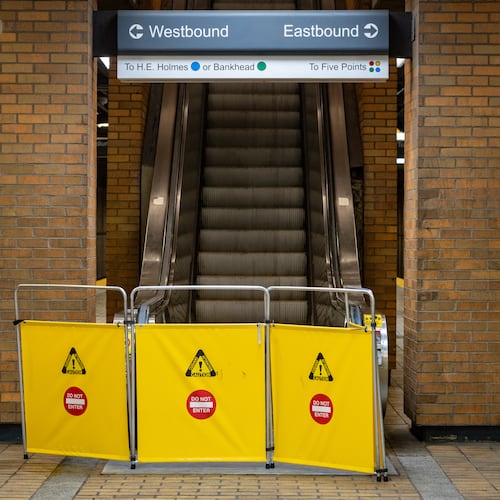The mayor of Stonecrest will have an opportunity to plead guilty in a federal fraud case at the beginning of 2022.
Jason Lary, the city’s founding mayor, faces three felony charges after the FBI accused him of concocting a kickback scheme to steal more than $650,000 in federal pandemic relief funds. Prosecutors said Lary defrauded businesses and churches that received financial assistance from the city, adding that Lary used the allegedly stolen funds to cover his own tax liabilities and pay off a lakehouse mortgage.
On Nov. 10, Lary appeared in federal court and pleaded not guilty to the three charges: wire fraud; conspiracy to commit federal program theft; and federal program theft.
However, federal court records show a change of plea hearing is scheduled for Jan. 5 at 11 a.m. Given Lary’s prior plea, it’s likely he will plead guilty as part of a plea deal. This outcome was already teased by Lary’s attorney, Dwight Thomas.
“He accepts full responsibility,” Thomas said in court Nov. 10, “and there won’t be a jury trial.”
Lary, 59, waived his right for the case to go before a grand jury. Instead, the case proceeded using a “criminal information,” not an indictment, as the charging document, which is usually an indicator that a plea deal is coming.
Lary, who has repeatedly denied any allegations of wrongdoing, told The Atlanta Journal-Constitution via text Thursday morning that “any further comments” would come from his attorney. Thomas told the AJC he can’t comment until after the Jan. 5 hearing.
Despite the charges, Lary has not resigned. In public meetings after his court appearance, he maligned city staff as “lazy” and “inept,” asked why other city officials got paid more than him and implied he has no intentions to step down.
“I’m the mayor of the City of Stonecrest and will be until the people say I’m not or until some other entity says that I’m not,” Lary said during a Stonecrest Housing Meeting that took place hours after the Nov. 10 arraignment.
Lary isn’t the only person charged in this case. Lania Boone, 60, a bookkeeper for the company hired by Stonecrest to distribute the federal funds, was also arraigned on a conspiracy charge. She’s the wife of Clarence Boone, the city’s former economic development director who was fired as a result of investigations in the city’s relief program.
Court records do not show a scheduled hearing in her case.
Stonecrest received $6.2 million in Coronavirus Aid, Relief and Economic Security (CARES) Act funds, and the two are accused of taking some of the funds for themselves. Lary allegedly had the city improperly enter into a contract with a recently founded nonprofit, Municipal Resource Partners Corporation, to distribute the city’s funds as a way to siphon money toward himself and cohorts.
In a prior news release, federal prosecutors said Lary “allegedly worked behind the scenes to assist MRPC, including by recruiting its CEO, opening its bank accounts and ensuring that Lania Boone would be hired as MRPC’s bookkeeper.”
Small businesses that applied for financial relief were asked on an application form if they’d be willing to give 25% of the grant to one of three companies to market their business. Those companies were all connected to Lary.
Prosecutors said Lary helped decide where the relief funds were directed, including an unsolicited $150,000 grant award to his church. In return, the church was asked to give $50,000 to one of those three companies. Lary allegedly said the funds would assist with home repairs for people who could not afford them due to the pandemic, but prosecutors said the money was used by Lary to pay off various personal tax liabilities.
Lary is also accused of giving a $50,000 check to another church with the caveat that they contribute $4,500 to one of the three companies. The church was told it would be for pandemic-related rent assistance, but Lary allegedly used the funds to pay off his own property expenses and his dues to the Georgia Campaign Finance Committee.
Prosecutors also found that $108,000 of relief funds were used to pay off the mortgage on a lakefront home owned by Lary, while another $7,600 was used to pay college tuition and rent for Boone’s son.
BJay Pak, the former U.S. attorney for Atlanta, previously told the AJC that prosecutors would likely recommend a sentence that includes prison time. However, Lary could request lenience based on factors including his age and his ongoing battle with prostate cancer.
Our reporting
The Atlanta Journal-Constitution has covered the allegations against Lary and his alleged abuse of the Stonecrest’s CARES Act program throughout 2021. The AJC was the first news outlet to obtain the internal investigative report in April and report its details. Since then, the AJC has published more than two dozen stories diving into the allegations, the structure of the alleged scheme and the investigation’s fallout.
About the Author
Keep Reading
The Latest
Featured



